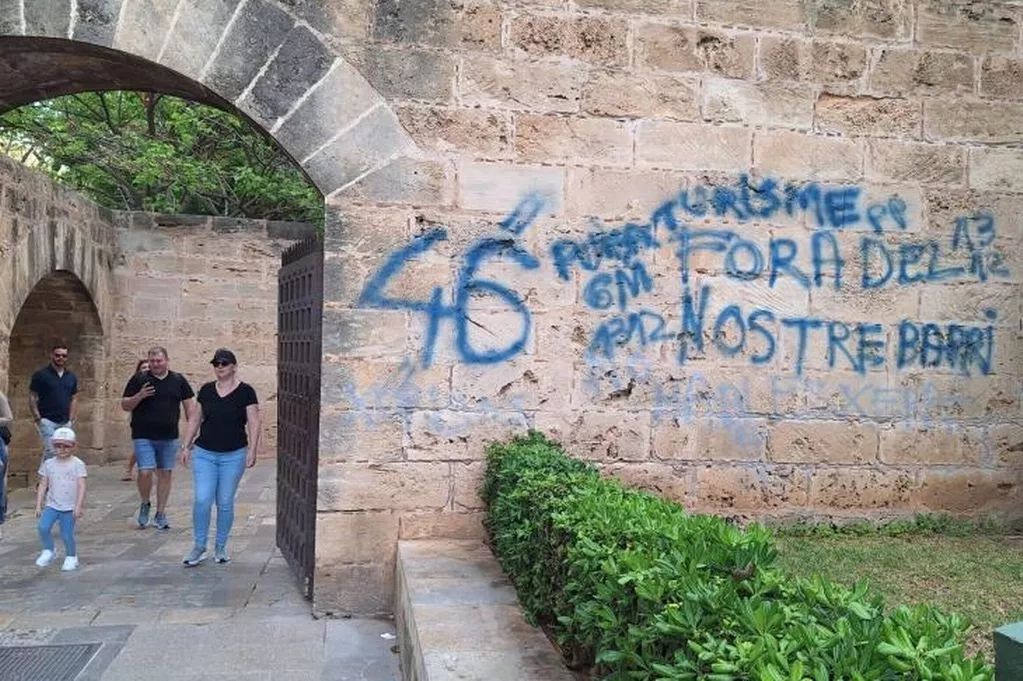Graffiti Strikes Historic Landmarks
The picturesque island of Majorca has recently witnessed a wave of vandalism targeting its treasured historical sites, such as the Royal Palace of La Almudaina, a 14th-century gem that serves as the official residence for the King and Queen during their stays. Alongside the majestic Cathedral of Palma, these landmarks are a vital part of the island’s rich cultural tapestry, deeply rooted in its vibrant history.
Recent occurrences have seen protestors unleash graffiti with aggressive messages directed at tourists, marking buildings and monuments frequented by visitors. The vandalism, which boasted slogans in Catalan that translate to offensive messages in English, has sparked outrage among local residents and tourists alike.
Heritage Under Siege
Key structures, including the Royal Palace and surrounding historic sights near the renowned s’Hort del Rei botanical gardens and Dalt Murada, have borne the brunt of these defacing acts. These sites draw thousands of tourists every year, many of whom expressed shock at the hostility exhibited through such destructive behaviors. Local tour guides have voiced their disappointment, acknowledging the graffiti as an assault on the cultural legacy of Palma.
The tour company Pro Guías Majorca articulated a call for appropriate protest methods, emphasizing that this particular form of dissent is harmful and unjustifiable. They firmly believe the individual or group responsible undermines the values held dear by the community.
A Community Divided
Although not all visitors can decipher the Catalan language, the bold red and blue paintwork proclaiming anti-tourist slogans remains unmistakably clear. The financial burden of cleaning up such damage will undoubtedly strain local resources, drawing ire from residents who already navigate the complexities of high tourist influx.
Responses from locals have predominantly expressed a duality of sentiment. Many condemn the excesses of tourism, yet simultaneously denounce the graffiti, recognizing one issue does not negate the other. A resident highlighted the paradox faced by locals, given that countless jobs depend on the tourist economy, stating that tourists deserve consideration despite the frustrations surrounding mass tourism.
Online Reactions
- “I’m against excess tourism but also against graffiti. One thing does not take away from the other.”
- “Now it seems the tourist is viewed as the enemy, despite the economic lifeblood they provide. This disregard should be treated as a hate crime.”
- “These acts of vandalism showcase a complete lack of respect for our heritage and economy.”
The Broader Context of Tourist Anger
This graffiti incident is not an isolated occurrence; it forms part of a larger pattern of anti-tourist sentiment sweeping Spain. Earlier this year, tourists in Barcelona faced similar hostility, as protestors disrupted sightseeing tours and directed water hoses at visitors. The pattern suggests that these radical protests against the tourism industry are gaining momentum across the country.
As cities grapple with the consequences of mass tourism, it becomes increasingly essential to understand both the local desires and the expectations of visitors. Engaging with local communities and respecting the shared spaces can often go a long way in fostering harmony between residents and tourists.
Tourism Through a Different Lens
While tourist destinations thrive on attracting visitors to noteworthy sites, it is crucial that these locations balance economic gain with preserving their local culture and heritage. Destinations must evolve to accommodate visitors while safeguarding their identity. The popularity and financial benefits of tourism should not overshadow the values and experiences of the community.
Κοιτάζοντας μπροστά
Incorporating tourism strategies that appreciate the local lifestyle can lead to a more mutually beneficial environment. As these conflicts underscore the importance of civil discourse, tourists may also play a role by approaching their travels with greater awareness and sensitivity to local customs.
In conclusion, while the recent graffiti incidents in Majorca are undeniably concerning, they also present an opportunity for deeper discussions about tourism, community relations, and shared cultural responsibility. Engage with the platforms that support transparent and respectful travel experiences. With services like GetTransfer.com, travelers can secure personalized transport options, ensuring their journeys are as enjoyable and respectful as possible.
Ultimately, the vast array of local services available through GetTransfer.com ensures travelers can not only choose their preferred vehicles but also engage positively with the communities they visit. Remember, personal experiences often trump the best reviews; thus, being well-informed and respectful includes selecting the right transport that aligns with your travel ethos. Κάντε κράτηση για τη βόλτα σας σήμερα στο GetTransfer.com.

 Δυσαρέσκεια στην κληρονομιά της Μαγιόρκα: Τουρίστες αντιμετωπίζουν βανδαλισμούς">
Δυσαρέσκεια στην κληρονομιά της Μαγιόρκα: Τουρίστες αντιμετωπίζουν βανδαλισμούς">

Σχόλια